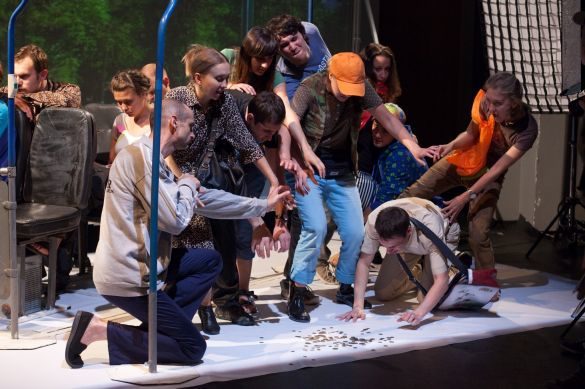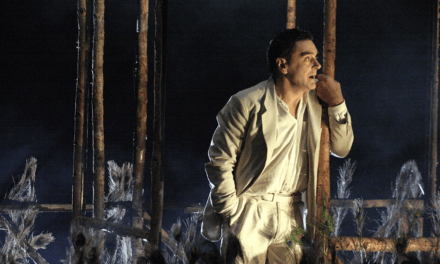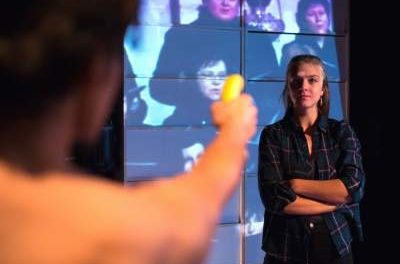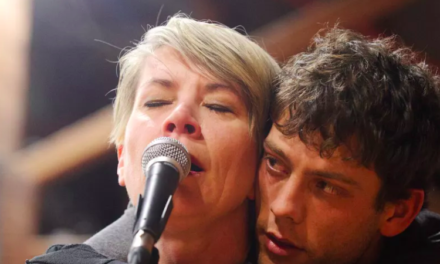Back when I used to publish a blog called TheaterPlus on the website of The Moscow Times, I would often do what I called “video blogs.” That is, I would train my little camera at someone interesting and I would coerce them into sharing their knowledge of, interest in, or thoughts about, Russian culture. I also called this my Blair Witch Project because that justified my shaky hand and other frequent glitches, such as the extraneous sounds of passersby and the hand strap banging against the camera body in the above video. I like to think these peculiarities only enhance the importance of these videos as unrehearsed, eye-witness, first-person accounts of cultural history being made. Having lost my ability to post TheaterPlus on its former host, I am happy to relaunch it as a project I will do from time to time for The Theatre Times.
Sasha Dugdale is now a poet, a playwright, a translator, and the editor of the journal Modern Poetry in Translation. I can say I knew her when. I knew Sasha when she worked in the office of the British Council in Moscow. This was at the turn of the century. In terms of contemporary Russian drama, this was almost a prehistoric age. I didn’t exactly lose track of Sasha when she returned to England well over a decade ago. I was more than aware that she became one of the most important translators of new Russian drama into English.
Working with the Royal Court and other organizations, Sasha was the first to bring the works of Vasily Sigarev, the Presnyakov brothers, Ivan Vyrypayev and a host of other important Russian dramatists to British and American stages. As such when I crossed paths with Sasha at a conference, “Back to the USSR? Drama and Theatre in Ukraine and Russia”, at Oxford University in early November, I leaped at the chance to sit her down in front of my camera. I asked her to recall what she remembered about the birth of new Russian drama when she was there to help midwife it. What follows is a selected digest of the comments Sasha made. To hear her whole story in her own voice, watch the video above.
According to Dugdale, “two frequent visitors” to the British Council in the late 1990s were playwright Yelena Gremina, a future co-founder of the now-famous Teatr.doc, and playwright Alexei Kazantsev, who was the artistic director and founder of Moscow’s Playwright and Director Center. The strong reputation of new writing in England, including “in-yer-face” dramatists like Caryl Churchill and Mark Ravenhill, had reached their Russian colleagues and they wanted to know more. As such, Dugdale went back to London, and, working with Elyse Dodgson, the head of the international department at the Royal Court Theater, set up a series of seminars and workshops in Moscow.
“The first event,” Dugdale recalls, “was a discussion with Graham Whybrow, the literary director at the Royal Court. It was supported by the Golden Mask [festival] and [Russian translator] Tatyana Oskolkova.” Moreover, Dugdale remembers Whybrow’s comments about the powers and the rights of British playwrights in British theaters striking the attending Russian writers as “revolutionary.” Russian writers, never invited to rehearsals, only occasionally invited to premieres of their shows, and often not paid a kopeck for their works which often came out under titles assigned by directors, could not believe there was such writers’ heaven as Britain seemed to them.
So successful was this first discussion that Dugdale, the British Council and the Royal Court set up several more workshops over the next year or two. They were headed by Stephen Daldry, James Macdonald, Rebecca Prichard, and Dodgson herself.
“Elyse Dodgson mentioned verbatim, after which Lena Gremina came to us and asked for a workshop in verbatim,” Dugdale said.
What happened then surprised everyone.
“It kind of went wild, it was crazy,” Dugdale recalls. “I don’t think any of us were prepared for that. The degree of engagement with verbatim and documentary theater was completely unexpected. And, of course, like anything in Russia, it took its own course completely. It had a very different life form in Russia. It didn’t really obey the laws of verbatim, or it did occasionally but it didn’t have to. It was very free and liberating and it became very important for a lot of people in new writing.”
The first big project to grow out of the workshops was a multi-author play called Moscow – Open City. It changed over time, and at any given moment there might be as many as 16 authors represented in the short scenes that comprised the play. “The very young Maksym Kurochkin was a part of it and many others who became established playwrights,” Dugdale explained.
Roughly around 2000 or 2001, Moscow – Open City was brought to London to be shown at the Royal Court, an event that coincided with the appearance in Russia of Vasily Sigarev’s seminal play Plasticine. These unconnected, but parallel developments lead to the presentation of full productions of several Sigarev plays in London (Black Milk winning him the Evening Standard Theater Award for most promising playwright in 2002), as well as Terrorism and Playing the Victim by the Presnyakov brothers, and Oxygen by Ivan Vyrypayev.
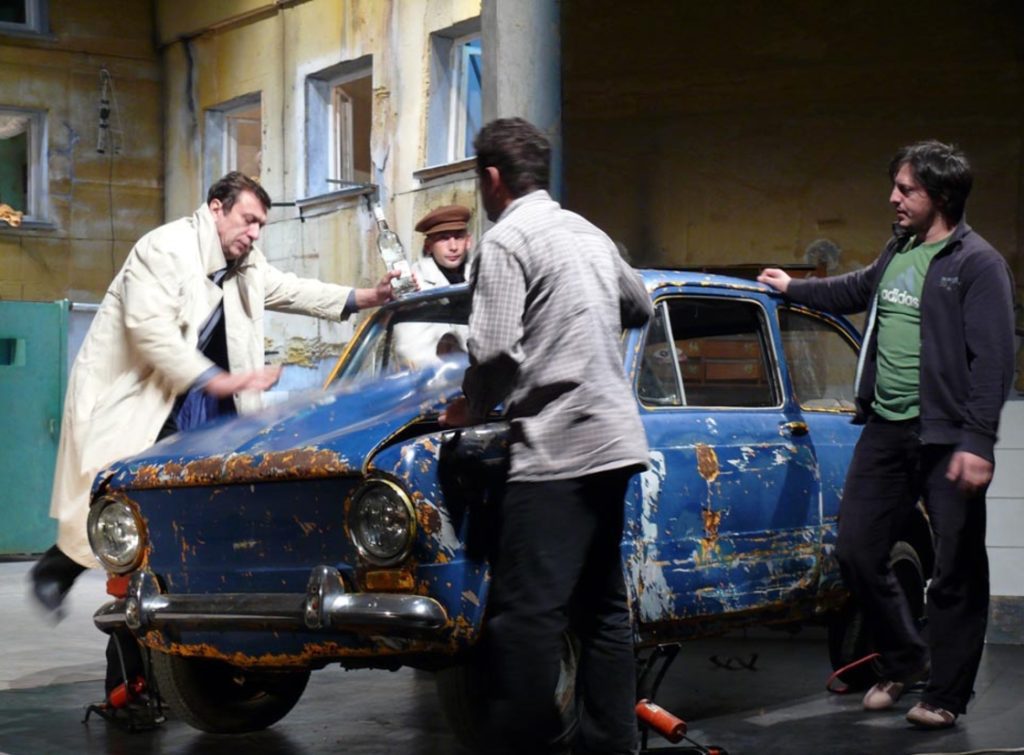
Vasily Sigarev’s Plasticine directed by Vlad Massaci at Radu Stanca National Theatre of Sibiu, 2010. Photo: Liviu Vlad
Also traveling to London as part of various workshops at the Royal Court were Yevgeny Grishkovets’ Lozha Theater from the Siberian city of Kemerovo and the all-female theater called Babii, or Broads, from Chelyabinsk in the southern Ural Mountain chain. These theaters “made a tremendous impact on London, although I don’t know what they’re doing now,” Dugdale pointed out.
Referring to the point in time when the Royal Court and verbatim drama came to Russia, Dugdale concluded, “Like any revolution, when you’re there to witness it, you don’t really know quite what you’re living through. But when you look back on it, you see the influence it had on Russian theater, and, through that, on world and European theater. I have no doubt that it made a lot of difference to the quality of new writing around the world because it was so different, so unpredictable, so wild, so much it’s own thing.”
This post was written by the author in their personal capacity.The opinions expressed in this article are the author’s own and do not reflect the view of The Theatre Times, their staff or collaborators.
This post was written by John Freedman.
The views expressed here belong to the author and do not necessarily reflect our views and opinions.

